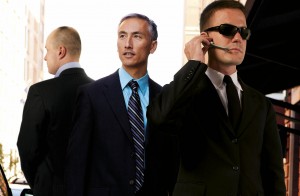 Some people think that the most a bodyguard does is to protect the rich and famous by looking tough and occasionally protecting them from any possible threats or dangers. But there is in fact a lot more to the role of a bodyguard than people give them credit for – it’s not just following around people of importance and the job itself can be incredibly tough, both to qualify for and on a day-to-day basis.
Some people think that the most a bodyguard does is to protect the rich and famous by looking tough and occasionally protecting them from any possible threats or dangers. But there is in fact a lot more to the role of a bodyguard than people give them credit for – it’s not just following around people of importance and the job itself can be incredibly tough, both to qualify for and on a day-to-day basis.
According to the National Career Service, being a bodyguard takes a lot more than looking menacing; in fact, most bodyguards look relatively normal but have a very unique skillset that sets them apart and makes them perfect for protection purposes. There are a number of duties bodyguards are expected to perform. These include:
- Protecting the client (or clients) from danger, harm or any threat of any kind. This could be from members of the public, terrorists, stalkers, fans, or any potential enemies. This is one of the key roles of being a bodyguard.
- Being comfortable researching any potential threats to the client/s and being capable of creating an effective plan to work around any such threats. Again, this is a key role a bodyguard plays in protecting the client – it’s not all about protecting them in the moment, but taking the time before any kind of excursion to assess potential dangers and be prepared. Good practice for this is for a bodyguard to look over the client’s itinerary for the day and working out potential danger zones from that.
- Having the common sense to scout any premises before the client enters. Whilst some places may have their own security measures in place, it is still essential for bodyguards to do their own security check and become familiar with the environment for the sake of the client – just in case something does happen.
- Have the ability to transport the client to and from events. Whilst the majority of the driving a bodyguard will do will be relatively straight forward, and they will simply need to have a driver’s license, sometimes they will need to get a client away from a venue at speed – and this takes specialist driving ability. Routes will also need to be carefully planned before any journey takes place.
- Have quick reactions and the ability to change a plan or come up with a new course of action at the drop of a hat. Sometimes situations can change rapidly, so a bodyguard needs to be ready for any such developments and be able to react accordingly and get the client to safety.
So these are some of the main duties, but what qualifications does a bodyguard require? In England and Wales, most bodyguards require a Security Industry Authority (SIA) license and to have completed an SIA approved training course. First-aid awareness is also a plus, and you will also require a clean criminal record.
The hours for being a bodyguard can be unconventional; some bodyguards will be expected to work through the night and at weekends, and some may be part of a 24-hour protection squad if the client is particularly important. The location will always be different, as will specific situations and potential threats.
Whilst this may all sound very exciting, it is a high-pressure job and it is therefore best to hire a bodyguard if you think one is required. A qualified security expert will provide the specialist skills and professionalism to help maintain a high level of protection for whoever requires it.
